Almost There: Danielle Deadwyler in "Till"
 Friday, February 17, 2023 at 9:50AM
Friday, February 17, 2023 at 9:50AM 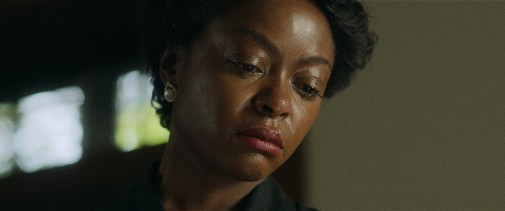
The Oscars are less than a month away, but our collective hearts still ache for those who the Academy snubbed. Indeed, you showed up in force when asked to vote on which unnominated performance deserved a complete analysis. The two definitive winners were Danielle Deadwyler and Dolly De Leon, who, when combined, won 58% of the total of over 800 votes. We'll get to the Triangle of Sadness shipwreck survivor closer to the ceremony, but first, let's consider the lead of Chinonye Chukwu's sophomore feature. Playing Mamie Till Mobley, Deadwyler delivers a powerhouse performance tasked with sustaining a historical narrative so painful it's sometimes hard to watch…
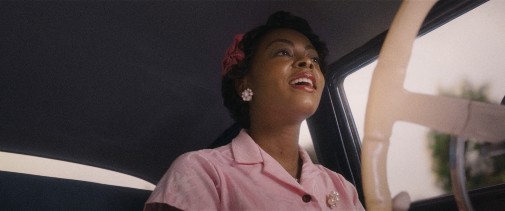
Before tragedy falls upon Mamie and her son, the audience is introduced to the Till family in a moment of teetering joy. It's August 1955, and the mother-son duo is shopping in downtown Chicago before Emmett leaves for a summer vacation with the extended family down south. Right away, Chukwu is teaching us how to watch Till, predicating the unspoken racial tensions of midcentury America in the microscopic shifts in Deadwyler's face. Whether lip-syncing to the radio in her car or walking through a department store, Mamie's joy is a fragile compromise.
Expressing it can be dangerous, both because of unwanted attention and the sense of false security it might instill. The mere presence of white people, their judgmental gazes out of focus, in the background of scenes seems to exude a gravitational force weighting down on the woman's shoulders. Moreover, the interplay between Deadwyler and Jalyn Hall as her on-screen son clues the audience to a shared history of parental love, concern, fear. As presented, Emmett appears innocent and jolly, a happy teen that's somewhat ignorant to the outside pressures that make his mother behave as if a livewire of electricity is running through her body at all times.
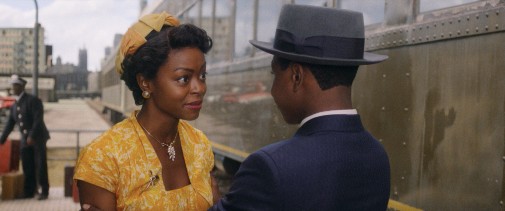
In ten minutes, Deadwyler sketches fourteen years of motherly love, forcing the spectator to be viscerally aware of the emotional stakes for the individual character. As much as Till is interested in the historical importance of these events, it's equally as concerned with the human reality that can be lost when painful stories become abstracted into impossibly distant facts on the pages of history books. The bitter struggles of Mamie are never a faraway mirage, obscured by the haze of retrospective nobility. Not when Danielle Deadwyler is portraying them for Chinonye Chukwu's camera.
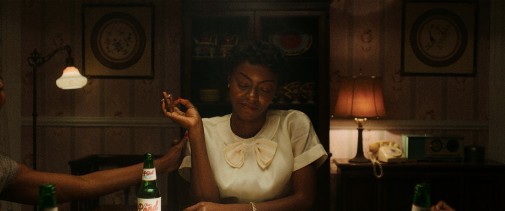
Regard the jittery unease of a mother separated from her boy for the first time in her life. See how it manifests in nervous negotiations with a confused beau who doesn't completely get what's going underneath the surface of his beloved. Notice the maternal pride when talking about him with friends over a card game, a shot of glee tempered by the sting of absence. It's as if, no matter what happens, Mamie always holds her breath, doubting her joy can last in this cruel world. She's waiting for the other shoe to drop, a harrowing condition expressed by perpetual swallowed panic.
When Mamie first gets a call informing her that her son has been taken, that his captors may be asking for money, Deadwyler starts revealing some accumulated pressure in fits and starts. She's a pressure cooker letting out some steam, or else an explosion is inevitable. This story needs its actors to react to a parade of outrageous horrors, no one more so than the protagonist. And yet, neither the performer nor director let these reactions fall into monotonal sameness. Different levels of politeness reveal how much Mamie is in control of her emotions at any given time. Adherence to the script of social theater is variable, turning the character arc into a rollercoaster.
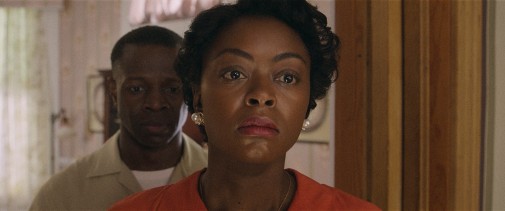
Such details also help imbue the portrayal with period specificity, showing a woman molded by norms no longer in place. Deadwyler thus negotiates between making Mamie's reality immediate to the viewer while refusing to render her into a modernized projection of the present superimposed over the historical woman. It's a complicated balance, a thin line she walks surely and with finesse. Such characteristics are further exacerbated by the director's technique, wavering its performance demands between extreme demonstrativeness and closed-off restraint.
For example, the instant a mother receives the news no mother should ever hear is all about the camera movement's isolating effect. On that occasion, the actress subsumes her expression, cutting the connection between inner thought and exterior manifestation, internalizing it all for one unforgettable flash of stillness. For contrast, you have Mamie's first glimpse of the wooden box containing her son's remains, a scene when self-control is left at the door, sacrificed for an explosion of feeling that's so big the sound mix seems intent on smothering it. Is it too much? Maybe it's just enough, considering what's being dramatized.
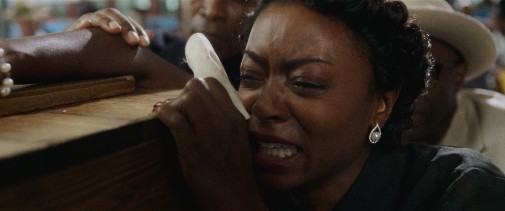
But again, it's all about the variations inherent to the mysteries of the human heart, presented in all its messiness and potential contradictions. As Mamie sees her son's body, Deadwyler goes smaller, and Chukwu moves closer, building the scene's staging around the search for recognition in Mamie's eyes, the bubbling anger at the injustice, the split-second when she decides to show the world what racial hatred did to her precious boy. As grief becomes weaponized, a public phenomenon fueled by private outrage, one starts to see a calculated edge to the character's expression. Each gesture, while backed by soul-shattering ache, is carefully considered.
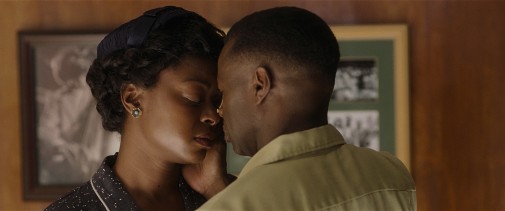
Mamie's transition from an unknown private citizen to a political activist is conveyed in the performance as much as it is explored by the text. Indignities pile on like firewood, burning from the inside out, the flames only visible through Deadwyler's eyes. She delineates galaxies of meaning, spending most of the trial scenes articulating complicated reactions in silence. Truly, there are qualities in the actress's work that remind one of great Silent Movie star turns, spectacles of emotional clarity that live beyond the necessity of spoken word. That's not to say Deadwyler falters in her vocal work, mind you.
Confronting her Mississippi family, soft cadences comfort bereaved youths to contrast with the broken harshness of Mamie's questioning of the adults. All that is prologue to the pièce de résistance, the mother's testimony on the stand. Chukwu fixes her camera on Deadwyler and refuses to cut away. As audience members, we're forced to confront every shift in the actress' face, watching up close as she embodies the ravages of grief crashing over the court, waves of sublimated hatred for all those who took Emmett's life. One can feel the mother's conviction in one's bones, a pain so great it's hard to comprehend yet vicious to contemplate.
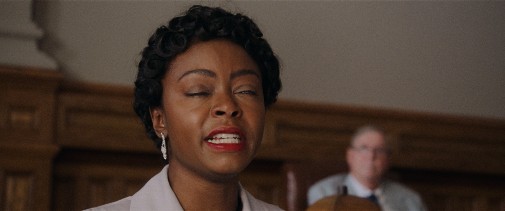
Eyes rolling to the back of her head while describing the boy's body, Deadwyler looks like a woman possessed in a grotesque vision that underlines Mamie's dignity by repudiating idealized notions of loss. It's not pretty nor necessarily beautiful, edges left raw rather than sanded away into smooth oblivion. Yet, as the defense attorney starts his questions, that vulnerability subsumes under an ocean of fury, mayhap contempt. This scene alone should guarantee Deadwyler's place among the greats, never mind an Oscar nomination. But wait, there are still 20 minutes left. From hearing Carolyn Bryant's disgusting lies to a public-speaking coda, Till's leading lady commands the screen throughout.
She never lets go. Only once, in that final smile that can only exist in the realm of memory and imagination, remembering everlasting love as a way to survive the world's cruelties. It's gently devastating.
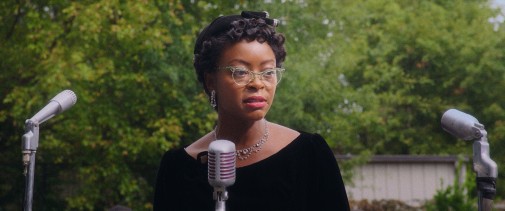
From Till's premiere at the New York Film Festival, critics were unanimous in praising Deadwyler, the actress immediately discussed as a likely Oscar contender. This status solidified as the awards season started proper. Precursor-wise, she won the Gotham Award, with additional nominations by BAFTA, SAG, and the BFCA. Sadly, the Best Actress lineup didn't feature Danielle Deadwyler on Oscar nomination morning. Instead, AMPAS chose Cate Blanchett in TÁR, Ana de Armas in Blonde, Andrea Riseborough in To Leslie, Michelle Williams in The Fabelmans, and Michelle Yeoh in Everything Everywhere All At Once. The winner will be unveiled on March 12th.
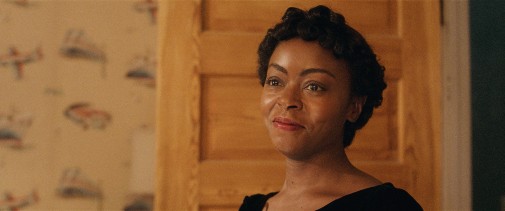
Till is available to rent or purchase on most of the major platforms.



Reader Comments (15)
A very measured response to this performance,agree on the camera always being at one with her face.
I loved her in this film but felt that right from the off she was too worried,she could've held off a little as she seems on the precipice of grief right from that train scene.
The viewing of the body and the courtroom scene are some best bits of acting I saw this year.
I was sad she missed nothing against the actresses Riseborough doing a Melissa Leo,De Armas trying to overcome her film or Williams but none of their performances thrilled me though I found something to like in each,I thought Williams made more sense 2nd time round.
I want Yeoh to win at the Oscars and think once Bafta maybe gives her the win she is getting more assured of the Oscar.
I know Nathaniel disagrees (sorry!) but in my mind, Michelle Williams is the odd woman out in this lineup. I just couldn't get behind the stylized performance. I couldn't tell if she was supposed to be quirky, had severe mental health issues, or was just badly directed. Perhaps all 3? Either way, she seemed like she was acting in a different movie than the rest of the cast. None of the attributes the other characters assigned to her fit with the person we were watching onscreen.
Haven't seen "Till" yet, but this writeup makes me want to this weekend.
A sad Almost There this time, as she was my third favorite lead Actress performance this year. To me, her missing was the only truly heartbreaking moment of nomination morning.
I didn't care for this performance. It was way too worried in the first act and way too over the top in the rest. The script and director are at fault for that, too, though. The whole thing felt very Oscar bait manipulation.
That said, I do think she's leagues better than Michelle Williams in The Fabelmans. I do not think she's better than Andrea in To Leslie (it's a good performance but far from her best) or Ana in Blonde (I thought she was captivating, even if the film is a mess), sorry.
Even though I didn't care for Danielle in Till, it made sense that she would be nominated.
I hope this Oscar cycle was instructive to those who participate in the prediction subculture, because there was a lesson to be learned: there is no such thing as a lone nominee that's a lock. Most of you fell for it. Frances Fisher did too.
Danielle Deadwyler was an unknown to me when I first saw her name on this site about a year ago. She's still an unknown; I haven't come across any information about her or her film since then, aside from a trailer. This could be my fault, but I'm trying to point out that my perspective falls outside the insular world of Oscar prediction, where her nomination was treated for months as canon.
The Lone Nominee was sort of the unifying theme of Oscar Nomination Morning, based on who got in as the lone nominee for their film (Ana de Armas, Andrea Riseborough, Paul Mescal, Brian Tyree Henry) and who didn't (Danielle Deadwyler, Eddie Redmayne, maybe Carey Mulligan). You also have Hong Chau, who bounced back this year from 2017, when her lone nominee lock prediction for Downsizing failed to happen.
I've left out Bill Nighy and Viola Davis for similar reasons. Nighy got in but wasn't his film's lone nominee. Davis was not nominated but wasn't necessarily being predicted as a lone nominee, but rather the most likely of a few nominations for her film.
I've been talking about actors, but the futility of predicting a lone nominee might extend to any full-length feature category: Costume Design, Sound, whatever. Lone nominees happen, and can be worth predicting, but are still firmly on the bubble. They make it in or they don't, but they are far from a sure thing.
Paranoid Andrew : I could not agree with you more. Michelle is one of my favorite actresses but that performance...yikes.
Sad Man : mostly agree with you on Deadwyler. I liked the performance a bit more than you did but you captured its detriments succinctly. Some scenes she comes off as stilted; other scenes she is WAY over the top. I did think she was great in the morgue and wotnes stand scenes though. She would not have been on my ballot but she would have been a better nominee than Williams.
I kind of wonder what the discourse would have looked like if the Best Actress slate had been:
Viola Davis
Danielle Deadwyler
Andrea Riseborough
Michelle Williams
Michelle Yeoh
And the perception had been that Riseborough had pushed out Cate Blanchett, a favoured front runner.
Would there have been worry that they had split the same kind of bloc of voters and that bloc of voters was too small? Would the discourse still have been “oh, kind of a pity, but them’s the breaks”?
Just saw this movie and I'm divided within myself. First, Deadwyler is so good in so many of the scenes in the film. That's undeniable. That court scene is WHEW. And yet, many others have articulated that she's already way too jittery in the beginning and isn't able to modulate emotional scenes as consistently as I expected. There's also the sheen of this being An Important Movie that's a bit of a turn-off from the get-go, but that's less her fault and more the script and maybe slightly the direction.
Her not being nominated was not great, but I don't think it was THAT shocking. She's not exactly a well-known name (yet) and the movie didn't have any other industry support. The WOMAN KING/Viola Davis shut out was much more surprising to me. If only THE HARDER THEY FALL had made more of an impact during its year (the movie was great and Deadwyler was lowkey the MVP there amidst a crazy STACKED cast).
*witness, not wotnes!
@Paranoid Android-Williams failed where Winslet made it in Wonder Wheel. Give an old fashioned 50s Hollywood performance.
Yeah, her missing out on that nomination is always gonna sting for me. The criticism that Mamie appears too worried in the beginning of the film makes no sense to me: she’s a Black woman originally from the south and the mother of a spirited Black child who isn’t used to having to make himself small, she knows what kind of trouble that can lead to. Of course she’s worried from the jump! She should’ve been nominated.
The film junkie : agreed but nonetheless it came off as melodramatic and artificial. Also, there is an odd scene where Mamie brushes off the white department store manager who asks her if she would be more "comfortable " shopping in another part of the store. I understand she was a proud woman but this too felt false.
Everyone: I liked her performance. I am just trying to point out that there were some small but noticeable flaws that perhaps led to her omission. Blanchett, Riseborough, Yeoh, and de Armas are so extraordinary. That's great cause for celebration.
PP92: oh you reminded me how much I LOVED Winslet in Wonder Wheel - a rewatch is in order.